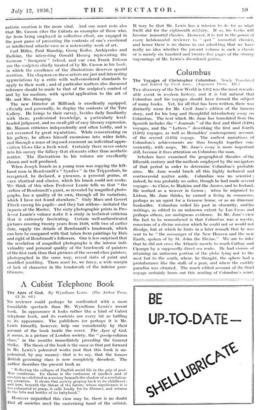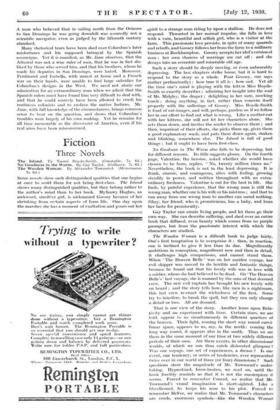Columbus
THE discovery of the New World in 1492 was the most r( mark- able event in modern history, and it is but natural that Columbus and his voyages should have formed the subject of many books. Yet, for all that has been written, there was distinctly room for Mr. Cecil Jane':; edition of the famous story, and for his long and thoughtful introductory essay on Columbus. The text which Mr. Jane has translated from tho Spanish includes the " Journals " of the first and third (1498) voyages, and the " Letters " describing the first and fourth (1503) voyages, as well as Dernaldez' contemporary account of the second (1493) voyage. The earliest narratives of Columbus's achievements are thus brought together con- veniently, with maps. Mr. Jane's essay is more important still, because it fixes attention on Columbus the man.
Scholars have examined the geographical theories of the fifteenth century and the methods employed by the navigators of that period in order to determine Columbus's probable aims. Mr. Jane would brush all this highly technical and controversial matter aside. Columbus was no scientist ; indeed, he was probably no sailor, though he had made several voyages—to Chios, to Madeira and the Azores, and to Iceland. He worked as a weaver in Genoa ; when he migrated to Lisbon, Mr. Jane thinks, he earned a living in col iiiii eree, perhaps as an agent for a Genoese house, or as an itinerant bookseller. Columbus veiled his past in obscurity, and his writings, as edited to an unknown extent by Las Ca,as and perhaps others, are ambiguous evidence. In Mr. Jane's view the fact to be remembered is that Columbus was a mystic, conscious of a divine mission which he could not or would not divulge, but at which be hints in a later remark that he was sent to be "the messenger of the New Heaven and the new Earth, spoken of by St. John the Divine." Wc arc to infer that he did not cross the Atlantic- merely to reach Cathay and Cipangu by a supposedly direct sea route. 1 le had visions of attaining an unknown portion of the globe lying not to the west but to the south, where, he thought, the sphere had a protuberance like the stalk of a pear, and where the earthly paradise was situated. The much edited account of the third voyage certainly bears out this reading of Columbus's mind.
A man who believed that in sailing north from the Orinoco to San Domingo he was going downhill was assuredly not a scientific navigator, even as judged by the fifteenth century standard.
Many rhetorical tears have been shed over Columbus's later misfortunes and his supposed betrayal by the Spanish sovereigns. Yet it is manifest, as Mr. Jane observes, that the Admiral was not a wise ruler of men, that he was in fact dis- liked by those who served him, and that his brothers, whom he made his deputies in San Domingo, were hated. Moreover, Ferdinand and Isabella, with unrest at borne and a French war on their hands, were unable to find large subsidies for Columbus's designs in the West. We need not abate our admiration for an extraordinary man when we admit that the Spanish rulers must have found him very difficult to deal with, and that be could scarcely have been allowed to crush his mutinous colonists and to enslave the native Indians. Mr. Jane, with full knowledge of the circumstances, brings common sense to bear on the question, and shows that Columbus's troubles Were largely of his own making. Yet he remains for all time memorable as the discoverer of America, even if his real aims have been misconstrued.





































 Previous page
Previous page